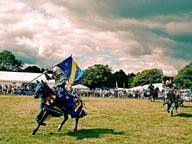Quiz Answer Key and Fun Facts
1. Hoods were worn most of the time by noble women during the early half of the sixteenth century. Anne Boleyn made what type of hood famous?
2. The bodice went around what area of the body?
3. What was 'hose'?
4. The farthingale served what function?
5. A doublet was a type of woman's shoe.
6. When did women usually wear a shift?
7. Ruffs were made popular by what Tudor monarch?
8. Most men wore a hat of some kind every day. This type of hat was very common at the Tudor court, and was a personal favorite of Henry VIII.
9. Jewelry, such as earrings, rings, and necklaces, were extremely popular at the Tudor court.
10. The term "pants" was not used in the sixteenth century. Instead, they were called this.
Source: Author
princess_1990
This quiz was reviewed by FunTrivia editor
bloomsby before going online.
Any errors found in FunTrivia content are routinely corrected through our feedback system.

